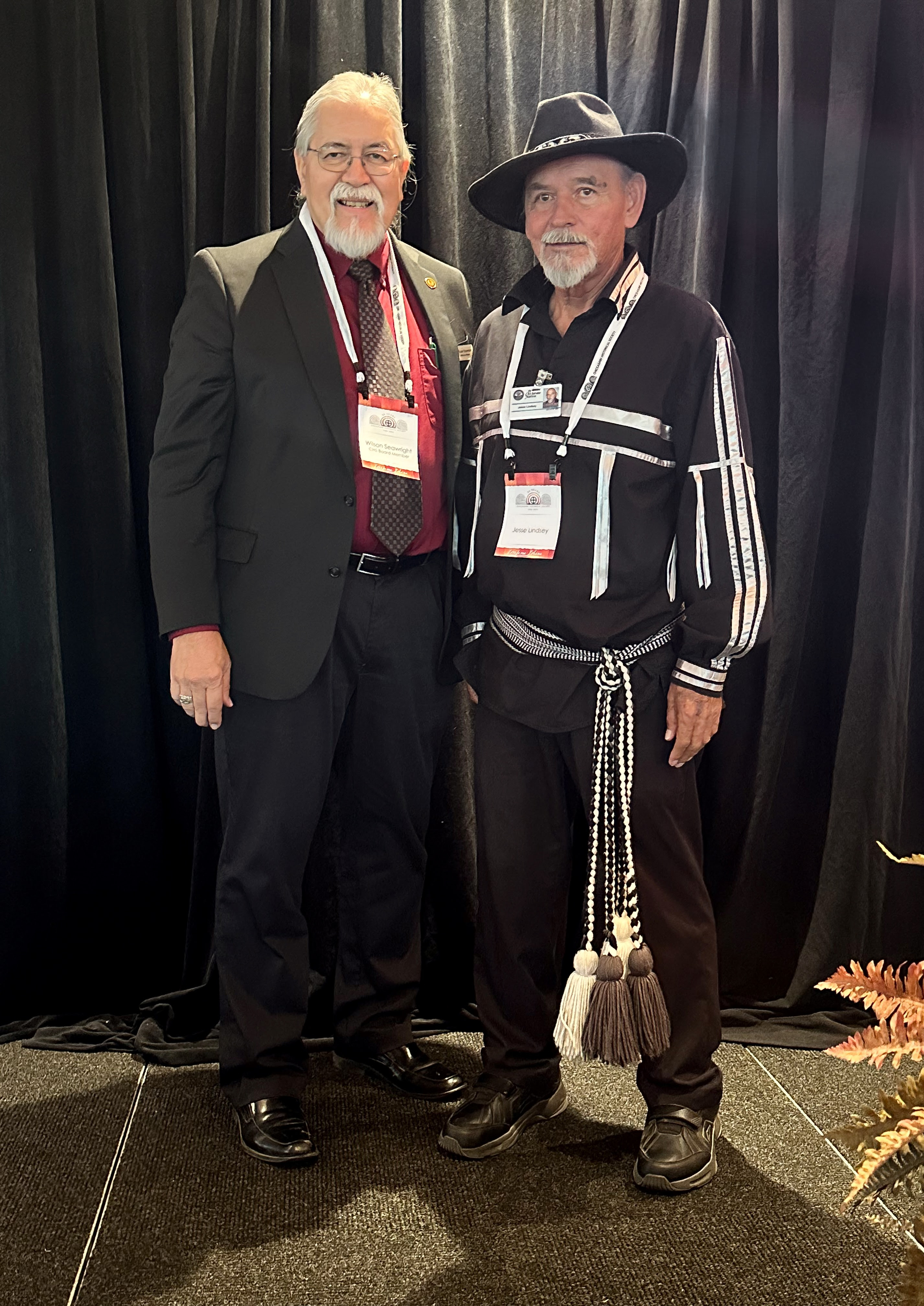
- Details
- By Chickasaw Nation Media
SULPHUR, Okla. – The 2024 Chickasaw Historical Society (CHS) Ittafama Ithana (Gathering to Learn) Conference, conducted Aug. 8-9, provided opportunity to honor a longtime culture keeper and learn about tribal food sovereignty, past and present. The annual conference was conducted at the Artesian Hotel.
The conference theme, “Cultural Connection to Plant Communities,” included educational presentations and discussion about traditional ecological knowledge and contemporary stewardship practices.
Jesse Lindsey, a Chickasaw citizen who has dedicated his life to preserving and sharing the Chickasaw culture, was awarded the CHS Lifetime Service Award.
The Chickasaw Historical Society Lifetime Service Award is presented by the CHS board of directors to individuals who exemplify a lifetime of service and outstanding contribution to Chickasaw history and culture, and far-reaching communities.
To introduce the honoree, board member Wilson Seawright read an excerpt from a 1994 newspaper article which featured Lindsey, of Sasakwa, Oklahoma.
“Thirty years ago, Jesse Lindsey was already sharing Chickasaw culture and history and he had been doing it for almost 10 years at that time,” Seawright said.
Utilizing the cultural knowledge he gleaned from his uncle, Chickasaw Hall of Fame inductee Adam Walker, Lindsey traveled to schools and events to educate others about bows and stickball.
In 1998, under the leadership of Chickasaw Nation Governor Bill Anoatubby, Lindsey and Walker helped open the Chickasaw Nation stomp dance grounds at Kullihoma, where Lindsey volunteered until 2005. He then joined the Chickasaw Cultural Center team and helped revive Chickasaw stomp dancing. Lindsey has served the Chickasaw Nation for 19 years.
Accepting the award, Lindsey said he was honored and blessed.
“Without taking time in my life out and asking my kinfolks questions about who we are, I would not stand here today,” Lindsey said.
Sharing Chickasaw culture has allowed Lindsey to experience historic events, such as the groundbreaking of the Smithsonian National Museum of the American Indian in Washington, D.C., he said.
“It is there forever to share with my grandkids.”
Lindsey also spoke of the importance of learning from elders and sharing cultural knowledge with others.
“I really appreciate being Chickasaw, and I am proud of it. I really feel honored today. Chokma'shki, thank you.”
The conference included several informative sessions based on the theme of “Cultural Connection to Plant Communities,” including “Food Sovereignty in Chickasaw Country,” by Dr. Judy Goforth Parker; “Climate Conditions and Their Impact on the Plant Communities within the Chickasaw Nation,” by Amelia Cook; “Chickasaw Food Sovereignty: From Yesterday to Today,” by Sierra Hampton; “Chickasaw Medicine,” by Rhonda Sellers; “Wildland Fire Management: Past, Present and Future,” by Miko Brandon; and “Water Settlement Implementation: Ensuring a Sustainable Water Future for the Chickasaw Nation,” by Newakis Weber.
The sessions, presented by Chickasaw and First American subject matter experts, provided a historic view of traditional Chickasaw food sovereignty and an overview of present-day tribal programs and services developed to maintain traditional lifeways, overcome challenges and ensure the Chickasaw people thrive.
The annual conference gives Chickasaw people a place to reconnect, and maintain and celebrate their Chickasaw identity, said conference organizers. Singing of traditional hymns was also included in the agenda.
Additionally, a reception was conducted the evening of Aug. 8 in the Artesian ballroom, which provided CHS members an opportunity to network and fellowship with one another.
The Chickasaw Historical Society was established by tribal law April 15, 1994. Board members are appointed by Chickasaw Nation Governor Bill Anoatubby.
For more information or to become a member, visit Chickasaw.net/CHS.
More Stories Like This
NCAI Passes Two Emergency Resolutions on Immigration Enforcement ActivitiesChickasaw Lighthorse Police Officer named Indian Country Law Enforcement Officer of the Year
Indian Gaming Association Rallies Broad Coalition Against Sports Event Contracts It Calls Illegal Threat to Tribal Sovereignty
Navajo Resources and Development Committee Issues Notice on Livestock Inspection Requirements
American Prairie, Tribal Coalition Files Protest Over Rescinded Grazing Rights
Help us defend tribal sovereignty.
At Native News Online, our mission is rooted in telling the stories that strengthen sovereignty and uplift Indigenous voices — not just at year’s end, but every single day.
Because of your generosity last year, we were able to keep our reporters on the ground in tribal communities, at national gatherings and in the halls of Congress — covering the issues that matter most to Indian Country: sovereignty, culture, education, health and economic opportunity.
That support sustained us through a tough year in 2025. Now, as we look to the year ahead, we need your help right now to ensure warrior journalism remains strong — reporting that defends tribal sovereignty, amplifies Native truth, and holds power accountable.
 The stakes couldn't be higher. Your support keeps Native voices heard, Native stories told and Native sovereignty defended.
The stakes couldn't be higher. Your support keeps Native voices heard, Native stories told and Native sovereignty defended.
Stand with Warrior Journalism today.
Levi Rickert (Potawatomi), Editor & Publisher

